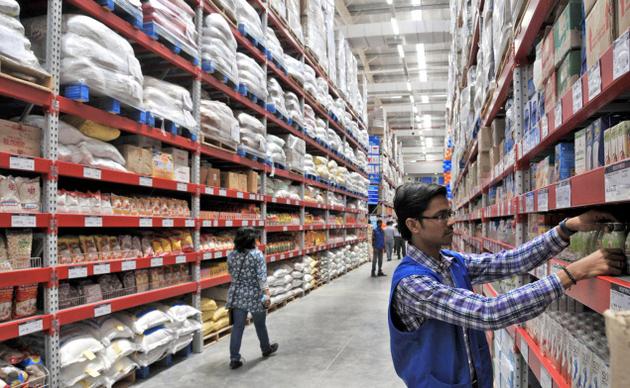FDI In Retail- ‘India Shining’ Or ‘India Sold Out’?
UPA has taken some gutsy steps to support the crumbling economic condition of the country, much to the ire of the supporting parties and the opposition. The decisions may seem bit hasty, but Manmohan Singh is back to job that is close to his heart. The dynamics of politics have been changing very rapidly in New Delhi, first the CoalGate, then the disruption of Parliament then increase in fuel costs. FDI was indeed much awaited step towards opening the economy for foreign players, much like in early 90s, which created hue and cry but it fuelled the economy to grow at much faster pace decade and half later. The clutter may be same this time, but reforms were waiting to be taken.
FDI in retail can do wonders to the local farmers if implemented in proper way; the middle men practice will be abolished. Though FDI will have long term impact, the diesel price rise will have short term impact; it will increase essentials’ prices immediately, but will curb the inflation later. The LPG prices after sixth cylinder show nothing but the enormous subsidy given on them. The FDI in aviation may be the last option left to save the industry. The political parties which are opposing the decision have typical concern- who will purchase from roadside vendors once Walmart comes in? But competition brings the best out of everyone and we the consumers are the winners. They also often forget that the kiranawala they are concerned about sells items that are overpriced and substandard sometimes. They do not have any regulation and hence large amount of tax revenue are lost as they do not give invoice on purchase. BJP may be opposing the decision, but they would have done the same had they been in power to maintain growth rate of economy. Other political parties in UPA may be opposing but may come forward to save the government. This shift of Congress from being Populist Party to development oriented one has been dramatic.
BJP has called for ‘Bharat Band’ to oppose the price rise and FDI in retail. But it sounds ridiculous to close the same kiranawala’s shop for their sake. The amount of revenue lost is large in such strikes is large apart from inconvenience caused by the people. Meanwhile the Government is bound to survive the acid test as the option of accepting the FDI in retail has been rested on state Government. Mamata’s TMC has always been populists favoring party, but their final call happens on Tuesday. No matter what happens, Manmohan Singh- The Economist has emerged a hero here especially in corporate world. It won’t be wrong to say- ‘when it rains, it pours.’
|
← Previous Story Raj Thackeray- The Man With A Mission, And Hopefully A Plan!
|
6 Comments
Leave a Reply
Cancel reply
-
Advertisement
Copyright © 2020 Indian Nerve. All Rights Reserved.


GotItRight Guy
September 17, 2012 at 5:42 pm
After following so many debates/discussions on News channels finally there’s someone who is speaking legit! But a two questions:
1- What happens to the middlemen once the practice gets wiped out?
2- Also with a size of their regular customers gone wouldn’t the kiranawalas would go really hard on the ones that are left especially who rely on the kind of credit system that exists at the kirana shops?
vikrant
September 17, 2012 at 9:57 pm
1-The middlemen practice, though present in many field, has not been beneficial. They are not net contributors to the economy as opposed to farmers. Additionally the retail sector will produce large amount of jobs, which to some extent can solve this problem.We cannot create a perfect system but essentially a system which benefits ..(Cont.)
vikrant
September 17, 2012 at 10:17 pm
the legitimate producers(farmers).
2- The kirana shop system will not be abolished fully(it cannot be). The easy credit system that these shop provide is in fact positive aspect. this will especially be important for their survival. Yes this may happen, but if they have to survive, I believe they would have improve the quality of their services.
GotItRight Guy
September 18, 2012 at 10:39 am
That was very insightful Sir! Thank You for the reply!
durga
September 23, 2012 at 8:32 am
I am really not comfortable when we end up relying on a someone else to boast economy of this country. The push which was needed – should have been from within the country , rather than bringing foreign companies to give a boast to completion here. It would be no surprise, when multinational companies start competing against each other and finally dry out local business here. This is already happening. Just take a very simple example of food outlets. Given a location with Mac D, KFC and a local food place – people would always choose to eat in MacD or KFC and reasons might be many such as food quality, ambiance, neatness. You cannot say – introduction of these two would improve the third local shop.
But the point being – if stringent hotel/food rules were introduced by gov over local food places, having a clear fines for neatness , freshness and set a specific standard which needs to be met, then the third shop would be able to appeal the masses – irrespective of whether we have MACD or KFC. Do you think every country which is now developed have implemented FDI??
The production line needs to be streamlined and tightened at every knot possible. Simple thought – when the veggies are grown in INDIA, why do we need Walmart to sell them in INDIA? can’t the existing supply chain be improved to deliver the same to existing markets with minimum loss to farmers?
The current change only depicts the governments incapability of handling issues within the country and rather rely on such schemes. I feel amused to think that when a gov could not pass Janlokpal bill, it could take such a step as passing the FDI bill?
thinking a little bit beyond – what would be the situation of a host country which invested in FDI in another country? incase the economy of this country goes down – it would either stop investing in the another country – thus causing a ripple in another country’s economy, otherwise – it would suck up resources from this country? I don’t see from what angle it is benefiting the country in anyways – except that we will see a boast in foriegn investments for a while and then we end up depending on them through out.
I think – we should now welcome 1847 and not 2012 as we are repeating the same mistakes over and over.
vikrant
September 23, 2012 at 12:10 pm
Your concern is right. But we need to ask one question to ourselves, do you think our government, irrespective of the political party in power has ability or for that matter system in place to improve the supply chain drastically in very short period of time? The red- tape in India is very strong to start new ventures and improve the existing business. Moreover the subsidies provided by the government has resulted in great fiscal losses. The economy is opening up and that means that we are more connected with the global markets. The downside of this is that if any tremors occur in global markets ripples will be seen in markets in India. But in spite of these, we cannot forget that the highest growth rate was achieved by this country was not under the License Raj, but under the open system which helped to attract investors from offshore which helped the local players and gave them confidence that they can compete at global stage, IT industry being the prime example. Now, the concern regarding the MacD and KFC’s flocking the markets, the penetration that they can achieve in the market is negligible as compared to the local food shops. The role of the Government becomes important here, they should not allow the indiscriminate opening of these stores in the city. We already are consuming so many foreign things that the opposition to FDI in retail seems absurd. Now consider international clothing range like Nike and Adidas are readily available in market, and we wear them as they have quality as well as the status factor that they bring in. Given the size of garment sector in India, this also is foreign investment and we have accepted it whole heartedly.
Now, regarding the concern that if vegetables are grown in India why do we need foreign chains to sell them. The farmers in this country are not getting the share of the growing economy, India is the agrarian economy where 70% of total population is still connected with the agriculture in some way or other for their income, still we hear the farmers’ suicide in country. The supply chain in India is not in good shape, it will improve but at it own pace. Economies like China has become a manufacturing capital for these brands, though it is due to cheap labor but still we can also improve our manufacturing sector, as we are mainly services based economy. The inflation is still bigger concern as rupee is at its all time low these days. And finally dont forget India is also investing huge capitals in ventures overseas especially in Africa and East Asia, so the concern should be how to maintain and supervise these investment in our country and for that Government has to have more teeth to deal with these companies. Competition improves the end product and consumer is the winner. FDI is welcome, but we cannot become dependent on it.